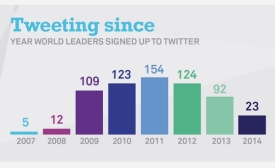hashtag diplomacy
As The Jerusalem Post reports, the effort to make Israel’s case is being spearheaded by 400 college students posting comments, memes, video clips, images and explanatory graphics on Facebook and Twitter from dozens of computers in a “Hasbara war room” at the Interdisciplinary Center in Herzliya, north of Tel Aviv.

Burson-Marsteller’s report, Twiplomacy Study 2014, is an annual study that looks at the global use of Twitter by world leaders as they exercise Digital Diplomacy. According to this study, more than half of the world’s foreign ministers from every region of the world and their institutions are active on Twitter. The report discusses how Twitter is fostering "virtual diplomatic networks" as well as social marketing campaigns that rely heavily on Hashtag Diplomacy.
Over the past week the hashtag #GazaUnderAttack has been used hundreds of thousands of times, often to distribute pictures claiming to show the effects the airstrikes. Some of the images are of the current situation in Gaza, but a #BBCtrending analysis has found that some date as far back as 2009 and others are from conflicts in Syria and Iraq.
Despite the encouraging news that 63 girls and women have reportedly escaped the grips of Boko Haram, the militant Islamic group still holds the more than 200 schoolgirls it kidnapped in April captive. Meanwhile, in Chibok, the home of the schoolgirls whose April 14 kidnapping by the group sparked off the #bringbackourgirls campaign, things have not improved.
Social media campaigns (such as Kony2012) are frequently dismissed as superficial and a displacement for real engagement – labelled "slacktivism". Yet, despite some difficulties, #BringBackOurGirls does appear to be a case where the worldwide outcry voiced through Twitter has had a genuine impact and promoted meaningful action. It has put the story into the mainstream, largely because it is now framed as a simple humanitarian drama – "horrible terrorists snatch innocent girls".
More than 20 members of the woman's family stoned her to death for the "crime" of "dishonoring" her family by choosing to marry someone she loved rather than a husband her family had chosen. Social media immediately picked up on the horrific and very public killing. #Farzana became a hashtag that provoked a conversation about the crime of so-called "honor killings" and society's tolerance and the police's alleged indifference to it.
The prime minister and other political leaders have added their voices to the campaign to lift the death sentence given to Meriam Ibrahim, a Sudanese woman sentenced to hang for apostasy. David Cameron's announcement came after Ibrahim's husband, Daniel Wani, appealed for global support to free his wife from death row, where she is being held with her two young children after giving birth in shackles this week.







